Letzte Woche war ich zur Abwechslung mal bei Jugendradio! Fein wars!! Mit Dank an Veronika Weidinger für die Einladung! Interview und Podcast zum Nachhören gibts hier:

Letzte Woche war ich zur Abwechslung mal bei Jugendradio! Fein wars!! Mit Dank an Veronika Weidinger für die Einladung! Interview und Podcast zum Nachhören gibts hier:
I’m very happy that my BD&S special issue article is online now!  It’s called “European Search? How to counter-imagine and counteract hegemonic search with European search engine projects” – it was a bit of a tough nut since critiquing big tech and their sociotechnical imaginaries appears to be much easier than thinking about (and realizing!) alternative technologies and their counter-imaginaries. And that’s exactly why we need to shift our attention from dominant, often corporate imaginaries towards alternative tech and their counter-imaginaries of digital futures – especially in the European context where notions of value-based Europe are strongly pushed in EU policy rhetoric, but remain empty catchphrases often times. To sum up, I’m proud that this article is out now & I would love to hear what you guys think about it!!
It’s called “European Search? How to counter-imagine and counteract hegemonic search with European search engine projects” – it was a bit of a tough nut since critiquing big tech and their sociotechnical imaginaries appears to be much easier than thinking about (and realizing!) alternative technologies and their counter-imaginaries. And that’s exactly why we need to shift our attention from dominant, often corporate imaginaries towards alternative tech and their counter-imaginaries of digital futures – especially in the European context where notions of value-based Europe are strongly pushed in EU policy rhetoric, but remain empty catchphrases often times. To sum up, I’m proud that this article is out now & I would love to hear what you guys think about it!!
Im Oktober habe ich mal wieder mit Herbert Gnauer über Suchmaschinen diskutiert (Radio Dispositiv auf Orange, 94.0). Genauer über alternative Suchmaschinen, sowie den Aufbau offener – öffentlich finanzierter – IT Infrastrukturen. Ein offener Web Index könnte die Grundlage für die Entwicklung von ganz unterschiedlichen Suchmaschinen, Ranking-Instrumenten, und Applikationen sein. Er könnte dem gegenwärtigen Monopolisten (Google) eine reichhaltige, buntere, diversere Suchmaschinenlandschaft entgegensetzen. Diese würde wesentlich besser zu unseren “europäischen Werten” – und hier insbesondere dem pluralen, multikulturellen, und diversen Europa – passen, als hegemoniale Ansprüche ein “europäisches Google” zu bauen, dem Europa kaum gerecht werden kann – alleine schon deshalb, weil Europa ganz anders funktioniert als die USA (und China) – Stichwort Datenschutz, aber auch kulturelle Eigenheiten, verschiedene Sprachen, fragmentierte Märkte etc, die es positiv nutzbar zu machen gilt! Ein offener Web Index – wie übrigens auch das dezentrale social network Mastodon – halten daher nicht nur alternative, verteilte, nachhaltigere Technologien für uns bereit, sondern auch alternative Imaginationen von Europa, die es weiter zu verfolgen gilt.
Zwei Initiativen machen sich hier insbesondere starkt: Die Open Web Index Initiative und die Open Search Foundation, die beide den Aufbau einens offenen Web Indexes anstreben. Es lohnt sich diese großartigen Projekte im Detail unter die Lupe zu nehmen!
Vielen Dank Herbert, dass Du diesen Ideen Raum in Deiner Sendung geboten hast! Es ist mir immer wieder eine Freude! Spoiler: zwei wiss. Artikel dazu sind gerade im Erscheinen (Big Data & Society) & in Begutachtung (book Project Europe) – more info coming soon!
Link zur Sendung Dispositiv auf Radio Orange 94.0: Machtmittel Suchmaschine – Astrid Mager zum Aufbau alternativer IT-Infrastrukturen
On the 12th of April we’ll host a big event at the newly renovated Austrian Academy of Sciences. I’ll first present the results of my long-standing habilitation project “Algorithmic Imaginaries” (funded by the Austrian Science Fund; Elise Richter Program), followed by a panel discussion with leading search engine scholars from all over Europe. Together with Elizabeth Van Couvering, Rosie Graham, and Bernhard Rieder we’ll discuss Google, surveillance capitalism, and discrimination; moderated by Ov Cristian Norocel and Richard Rogers. All infos and registration on-site can be found here; there’ll be a stream too!
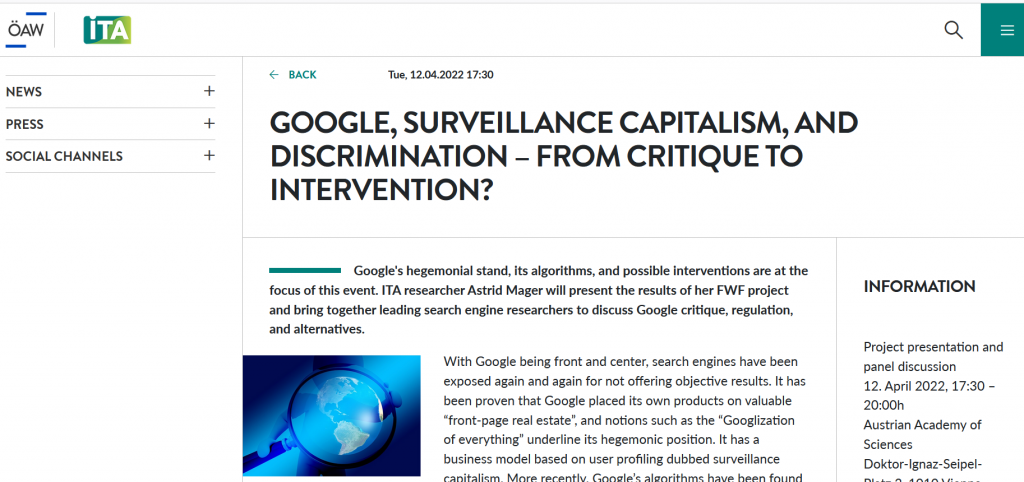 Before the public event we’ll be holding a writing workshop at the Institute of Technology Assessment to discuss the manuscripts for our special issue “From Google Critique to Intervention” to be published by Big Data & Society. I’m already looking forward to this get-together!! The video of the event can be found here.
Before the public event we’ll be holding a writing workshop at the Institute of Technology Assessment to discuss the manuscripts for our special issue “From Google Critique to Intervention” to be published by Big Data & Society. I’m already looking forward to this get-together!! The video of the event can be found here. 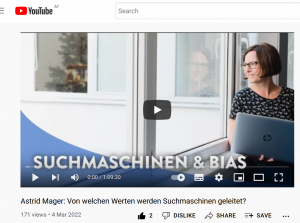
If you’d like to learn more about my project “Algorithmic Imaginaries” you might watch this video of the lecture I gave in Feburary as part of the ÖAW’s gender & diversity lecture series (in German). This lecture sparked quite some media attention including a cover in Der Standard’s “Forschung Spezial” 
In Austria, we’re diving through the “4th Corona wave” right now including a hard lockdown. Yet again, I’m sitting in my home (office) with the kids on my lap in case more than two school kids get infected in the same class. The responsibility has been fully shifted onto teachers, parents, and their kids by now. Politics has given up on the Covid-management of schools, as it seems. In the middle of this chaos, I’m enthusiastically thinking back to my (real!) trip to Lund two months ago. Olof Sundin and Alison Gerber invited me to give a keynote lecture at the interdisciplinary symposium In Search of Search (and its Engines). This workshop was a kind of gathering of pioneering search engine scholars that accompany me since my PhD (more than 15 years now). I finally met Elizabeth van Couvering, for example, whose work on the commercialization of Google and the creation of its business model based on the “traffic commodity” had a great impact on my PhD research. Also, Richard Rogers, Dirk Lewandowski, Jutta Haider, and other great scholars were there and it was FUN! (and not only because of the real food & drinks!) The best part is that we keep the lively debates about search engines, search engine research, and its academic & sociopolitical impact alive. We’re currently working on a special issue for Big Data & Society called The State of Google Critique and Intervention co-edited by Ov Cristian Norocel, Richard Rogers, and myself. We’re planning a workshop and a public event in Vienna (12 April 2022), which I love to organize in the middle of this 4th wave as a possibility to work towards a light at the end of the tunnel.. 😉 So stay tuned!
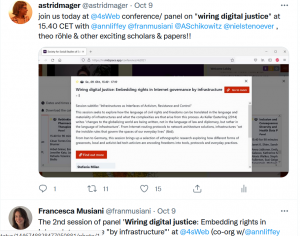 Moreover, almost as an exception to the rule, I attended a great 4S online session this year: Wiring digital justice: Embedding rights in Internet governance by infrastructure organized by Stefania Milan, Niels ten Oever, and Francesca Musiani. Despite the shitty online platform the conference was running on, the session organizers managed to trigger fruitful discussions by providing thoughtful comments after each of the presentations. My paper was titled “Encoding Freedom: Analysis of open search technology between German hacker ethics and Asian start-up culture” and triggered debates about Chinese tech development and the “metrics of freedom” that I’m still thinking about – now that I finally have time to analyze my rich empirical materials on open source communities and other alternative search projects.
Moreover, almost as an exception to the rule, I attended a great 4S online session this year: Wiring digital justice: Embedding rights in Internet governance by infrastructure organized by Stefania Milan, Niels ten Oever, and Francesca Musiani. Despite the shitty online platform the conference was running on, the session organizers managed to trigger fruitful discussions by providing thoughtful comments after each of the presentations. My paper was titled “Encoding Freedom: Analysis of open search technology between German hacker ethics and Asian start-up culture” and triggered debates about Chinese tech development and the “metrics of freedom” that I’m still thinking about – now that I finally have time to analyze my rich empirical materials on open source communities and other alternative search projects.
Here’s the link to the video documentary of past year’s Ars Electronica event “How to become a high-tech anti-discrimination activist collective” that was co-organized with the Johannes Kepler University in Linz (A). Both my colleague Doris Allhutter and me organized a workshop as part of this bigger event. My workshop was concerned with AI technology and open source alternatives: “How to create your own AI device with SUSI.AI – An Open Source Platform for Conversational Web”. It was a great opportunity to catch up with my co-workshop leader Hong Phuc Dang from SUSI.AI (one of my case studies of my current search engine project; see research). Many thanks to the organizers!! It was fun! 
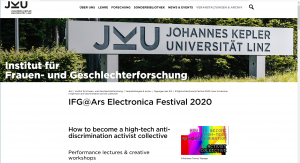 This year I have the pleasure to give a workshop together with Hong Phuc Dang as part of the ARS Electronica Festival 2020. The title is How to create your own AI device with SUSI.AI – An Open Source Platform for Conversational Web and its part of an overall event Waltraud Ernst and colleagues from the University of Linz have organized. The whole event is dealing with bias and discrimination in algorithmic systems: “How to become a high-tech anti-discrimination activist collective” with awesome keynotes by Lisa Nakamura and Safiya Noble; more infos can be found on the ARS/ Uni Linz website. There you can also register if you’re interested in participating! I’m already looking forward to this event!!!
This year I have the pleasure to give a workshop together with Hong Phuc Dang as part of the ARS Electronica Festival 2020. The title is How to create your own AI device with SUSI.AI – An Open Source Platform for Conversational Web and its part of an overall event Waltraud Ernst and colleagues from the University of Linz have organized. The whole event is dealing with bias and discrimination in algorithmic systems: “How to become a high-tech anti-discrimination activist collective” with awesome keynotes by Lisa Nakamura and Safiya Noble; more infos can be found on the ARS/ Uni Linz website. There you can also register if you’re interested in participating! I’m already looking forward to this event!!! 
Radiosendung zum Thema “Die Macht der Algorithmen”. Mit vielem lieben Dank an Herbert Gnauer!! Radio Dispositiv zu hören auf Orange 94.0 @HerbertGnauer
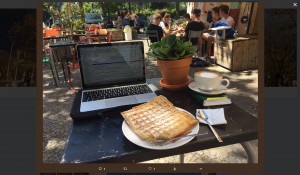 Thanks for your interest and great response to the FOSSASIA 2019 workshop I advertised in my previous blog post!
Thanks for your interest and great response to the FOSSASIA 2019 workshop I advertised in my previous blog post!  Are you a SUSI.AI developer/ contributor? Are you up for an experiment? Would you be willing to write a short piece of text on how the social appears in the technical development of SUSI.AI/ your daily work practices? This text should only be half a page or a page and you should’t think about it too hard; rather: you just find a nice spot (like I did last spring in Berlin, where the picture above was taken) and quickly write down what comes to your mind when you hear the following question:
Are you a SUSI.AI developer/ contributor? Are you up for an experiment? Would you be willing to write a short piece of text on how the social appears in the technical development of SUSI.AI/ your daily work practices? This text should only be half a page or a page and you should’t think about it too hard; rather: you just find a nice spot (like I did last spring in Berlin, where the picture above was taken) and quickly write down what comes to your mind when you hear the following question:
When and how did you encounter SUSI (standing for the social in terms of social biases, user imaginations, gender relations, your own desires and expectations, or something else that comes to your mind..) when developing/ contributing to SUSI.AI and how did you handle SUSI back then?
Please send your memories to me (astrid.mager(at)oeaw.ac.at) so that we can discuss/ work with them during the workshop. Based on these texts we’ll be able to draw out how to (better) handle SUSI in the future, but also how SUSI can be made productive in terms of creating more “open”, “transparent” or “fairer” (AI) technology more generally.
If you don’t find the time to write such a memory, don’t worry! I’d still be happy to see you at the workshop and learn about your ideas on the way SUSI figures in your work and how you usually deal with it!
Remember: The workshop titled “Where is SUSI in the AI?” will take place on Saturday, 16th March, 18-18.55, at the Event Hall 2-1. I’m already looking forward to seeing you there!!!  Please use this link to sign up for the workshop! Thank you!
Please use this link to sign up for the workshop! Thank you!
If you’re interested in learning more about working with memories in software design, I’d be happy to give you further insights in the method “mind scripting” I’ve been toying around with just recently. It’s a method developed by my colleague Doris Allhutter, who particularly created this method to investigate (and potentially also to intervene in) software practices.
If you’re a SUSI.AI developer I’d love to get in touch with you to learn about your work practices, your ideas about SUSI.AI and open source more generally, and to discuss what role the social – in terms of social biases, user imaginations, gender relations, your own desires, or something else that is important for you as a coder – plays in the technical development of SUSI.AI/ your own work. I’ve organized a workshop to provide a space for mutual learning experiences and to initiate a dialogue between informatics and social sciences; an interface I find tremendously important in times of growing social biases, discrimination and surveillance corporate tech triggers. Please let me know if you’d like to participate in the workshop and what you’re interested in to better prepare it in advance! Also, please spread the word and motivate other SUSI.AI developers to show up! The more participants, the better! 😉 If you don’t have time to participate in the workshop – I’m sure you guys will be busy over there – I’d still be happy to hear from you and find some other opportunity to chat at the summit. It’s going to be my first Asian Tech Summit so I’m really looking forward to be there and learn more about your great work!! Thanks also to Michael Christen and Mario Behling for supporting my work so far! I’m of coures looking forward to meeting you guys in Singapore too!!! YAY! 
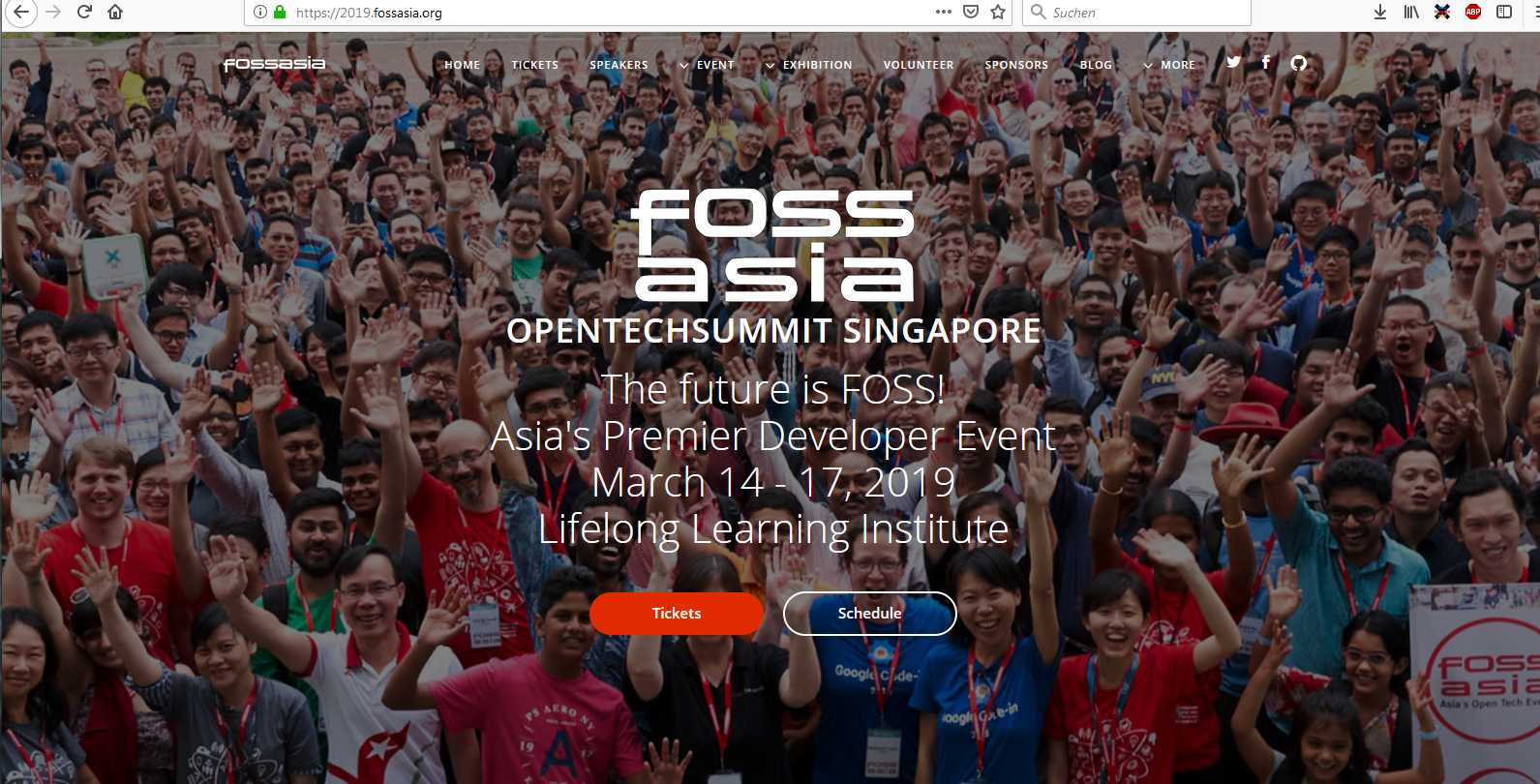 This ethnographic study on SUSI.AI is part of my ongoing research project “Algorithmic Imaginaries. Visions and values in the shaping of search engines”; funded by the Austrian Science Fund (FWF). A short – bit outdated – description of my project can be found at the ITA website. I’m happy to explain it further once we meet, of course!
This ethnographic study on SUSI.AI is part of my ongoing research project “Algorithmic Imaginaries. Visions and values in the shaping of search engines”; funded by the Austrian Science Fund (FWF). A short – bit outdated – description of my project can be found at the ITA website. I’m happy to explain it further once we meet, of course!
Here’s the abstract for the workshop titled “Where is SUSI in the AI” (Saturday 16th March, 18-18.55, Event Hall 2-1). Please use this link to sign up for the workshop.
There is a long research tradition in the field of science and technology studies (STS) showing the importance of the social in technical design processes. The notion sociotechnical design practices, for example, stands for tight entanglements and co-shaping processes of technical and social elements. Following this basic assumption critical algorithm studies, infrastructure studies, and software studies have started to investigate how social biases in big data, preferences of designers and coders, or imaginations of future users shape digital tools, software, or artificial intelligence. Moreover, innovative methods have been developed to not only analyze, but also problematize and intervene in software practices. “De-biasing” has become an issue of concern bringing together computer scientists and social scientists to learn from each other in the attempt to bring fairness, accountability and transparency to the table of software design.
Following this research tradition the proposed workshop tries to bring together developers, coders, researchers and other contributors working on SUSI.AI to address the following question: “Where is SUSI in the AI”? During the workshop the participants are invited to show and share how SUSI (standing for the social in terms of social biases, user imaginations, gender relations, developers’ own desires, or something else that is important for the SUSI.AI team) actually figures in the design process and how they deal with SUSI/ or hope to deal with SUSI in the future. While the workshop mainly invites contributors working on SUSI.AI, it is open to developers working on similar AI projects as well.
If you’re up for experimenting with a method using memory work before and during the workshop, please check out my next blog post! To be continued.. 😉
By continuing to use the site, you agree to the use of cookies. more information
The cookie settings on this website are set to "allow cookies" to give you the best browsing experience possible. If you continue to use this website without changing your cookie settings or you click "Accept" below then you are consenting to this.